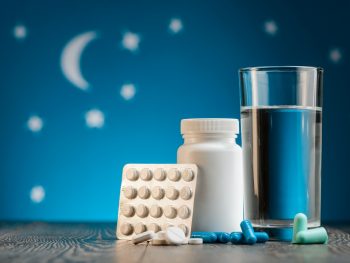Can you overdose on melatonin, a serotonin derivative created by the pineal gland and some other issues? It is believed to be responsible for modifying your sleep patterns. It can be thought of as the body’s natural sleep aid.
Usually, the production of the hormone is minimum during bright light and increased during the night when that tired feeling begins to kick in and you are drawn towards your bed. This is primarily why it is referred to as a sleep hormone.
Several foods are known to contain significant amounts of the hormone, which include: tomatoes, milk, cherries, rice, and olives. These foods can contribute to a tired feeling after dinner. It is also available in supplement form as a sleep aid.
Melatonin production varies from one person to another with respect to age, diet, lifestyle, stress, exposure to light, and sleep schedules among other factors. Therefore, this is a very important element of your sleep cycle. Continue reading to learn more!
Melatonin Benefits
Although, melatonin is something that most people may have not heard of in their lives, there are numerous benefits of this amazing hormone. We will help you understand these benefits at a far-reaching perspective.
Better Sleep and Wake Cycles
Sleeping problems are not unusual. In fact, a large number of the world’s adult population struggles with a sleeping disorder, which can be brought about by ulcers, heart disease, alcohol abuse, and acute stress along with other triggers.
However, sleep problems can manifest for no apparent reason, especially when one reaches middle age. Aging people are normally susceptible to disturbed sleeping patterns. Research suggests that approximately one-half of the American people above the age of 65 experience sleep disorders.
Sleep problems are also side effects of menopause. With the abovementioned cases, melatonin levels must be decreasing. As mentioned earlier, the hormone plays an important role in improving sleep during the night.
According to research, melatonin is needed during sleep and lack of it may lead to noticeable sleep issues. Recent studies by prominent scientists have recorded how the hormone has helped people improve their sleep by about seven minutes.
Researchers recommend a dosage of 2 mg at bedtime for sleep. However, some people may require as little as 0.5 mg for good night sleep. Some studies have revealed that melatonin aids people to adjust to phase shifts.
A great number of studies on travelers and airline crews have also discovered that the hormone helps with jet lag (sleep disturbance and fatigue that result from disruption of your body’s normal circadian tempo as a result of air travel).
Melatonin and Aging
This hormone has a direct impact on how you age and the rate at which you age. The pineal gland is considered to be a master gland. It has strong antioxidant properties, which are crucial for reducing the effects of free radicals in the body.
Along with antioxidant qualities, most of the other facets of the hormone display remarkable anti-aging features. Melatonin protects your brain from oxidation. Therefore, it helps with cognitive ability as well as allow for a longer and healthier old age.
As the level of melatonin drops with age, especially from 30 years old and beyond, it would be wise of you to check and increase the levels with supplemental forms of the hormone. Remember to consult a physician before taking supplements.
This will help with your overall health and increase longevity. You cannot afford not to know what is going on with your body when you are aging, not unless you are tired of life itself. So, keep those melatonin levels in check.
Melatonin and Cancer Prevention
A great number of researchers have reported that the hormone has a protective and preventive purpose in cancer therapy. Its cytotoxic properties on cancer cells make it a resourceful chemotherapeutic agent.
It acts as a differentiating agent at pharmacological and physiological concentrations in some cancer cases, reducing metastasis and invasion. In other cancer situations, it induces cell death. There are studies that have used melatonin as adjuvant treatment in progressive cancer.
Increased prevalence of cancer has been shown in people who are regularly exposed to abnormal artificial magnetic fields linked to suppressed nocturnal melatonin secretion. Studies show that the hormone regulates extra IGF-1 and estrogen levels.
Night shifts, particularly in men, have been reported to increase the rate of bladder, bowel, and prostate cancer. On the other hand, air hostesses have shown an increase in breast cancer. This shows how important melatonin is in the prevention of cancer.
Melatonin and Management of Type II Diabetes
Researchers report that decreased levels of the hormone increase cases of diabetes type two. The whole issue is still under investigation. However, there is a definite correlation between the incidence of diabetes and the level of melatonin in the body.
Normally, the lower the levels of melatonin, the more probable it will lead to the development of diabetes mellitus. Therefore, you can manage and prevent diabetes type 2 by taking melatonin supplements.
The secretion of this amazing agent has the effect of decreasing insulin secretion. It; therefore, acts as a regulator to help keep blood sugar levels in check while allowing your brain to receive the necessary amount of glucose through the night.
Melatonin Side Effects
The most common side effects that you can come across are morning grogginess, nausea, drowsiness, dizziness, and heavy head. While the general adverse effects are: reduction in body temperature in healthy people, confusion, self-reported vigor, fatigue, and sedation.
According to research, timing is important for the hormone to be effective. If it is administered at the wrong time for jet lag and other sleeping disorders, it can cause increased daytime sleepiness and poor mental performance.
A slight reduction in body temperature and drowsiness are commonly reported side effects, especially after daytime use. The hormone is usually safe for most grownups when injected or taken orally, but in short-term.
Long-term use is considered safe when administered appropriately through the mouth. According to some studies, there are some people who have used it as a supplement for up to two years. However, you should expect some significant side effects, such as depression and headaches.
The hormone is probably unsafe for pregnant and nursing women when ingested orally or injected. It is wise to avoid the use of melatonin. There is no conclusive evidence regarding these claims, but experts advise caution.
As far as children are concerned, this supplemental agent may be unsafe and may lead to a number of side effects when administered in multiple doses within a short period of time. Specialists believe that it may interfere with growth during adolescence.
In excess or when improperly used it might worsen bleeding in patients with bleeding problems. Some studies suggest that it can potentially escalate symptoms of depression. It helps regulate blood sugar, but it can also increase blood sugar if wrongly used.
People with blood pressure problem should avoid this supplemental agent since it can interfere with medication and raise blood pressure. If you have a seizure, you should keep off melatonin or you may risk having a seizure.
Melatonin Dosage
Correct dosage is one of the primary concerns as far as melatonin goes. You need to know if you should be taking very low doses of the supplement or if you should not take it at all. Is it safe to be taking the supplement based on your current health?
Generally, that is not how most people in the medical community think. Most online sources would advise you to take the lowest dose that works for you. However, most of these sources do not specify the number of milligrams you should be taking.
Fear not, we have conducted significant research that provides you with adequate information. University of Maryland Medical Center states that there isn’t a specific dosage for the supplement, since different users respond differently.
As said by research, you should maintain doses that are similar to the ones manufactured by the body, which is usually 0.3 mg per day. Go for the lowest amount if your aim is to achieve a specific effect.
Some studies on jetlag have recorded a range of 0.5 to 5 milligrams, which is used an hour before retiring to bed when the travelers reach their destinations. Others studies have recorded a range of 1 to 5 milligrams an hour before going to bed for a couple of days before traveling.
As stated by some individual researchers, a great number of commercially produced melatonin supplements contain above normal dosages that could increase the normal level of the hormone in your body and could be considered melatonin overdoses.
In other words, the recommended dosages that come with the products may amplify melatonin production in your body to alarming levels. A typical melatonin tablet consists of 3 milligrams, which is very much capable of raising the hormone’s levels twenty times over.
Dose Chart for Adults
There are many melatonin dose charts you can online, but here is our recommended dose chart according to our research:
| Health Condition | Appropriate Age | Correct Dose | Time of Use |
|---|---|---|---|
| Insomnia | 50+ years | 0.5 mg to 10 mg | Two hours prior to bed for a few months |
| Menopause | 18+ years | 1 mg to 3 mg | Two hours prior to bed for three to six months |
| Jetlag | 18+ years | 0.5 mg to 8 mg | Prior to departure and at destination |
| REM sleep disorder | 18+ years | 3 mg to 9 mg | On a daily basis for a number of weeks |
| Depression leading to lack of sleep | 18+ years | 0.1 mg to 9 mg | Four weeks |
| General sleep issues | 18+ years | 0.5 mg to 10 mg | A couple of hours before bed |
| Restless leg syndrome | 18+ years | 3 mg | A couple of hours before bed |
| Improving body temperature | 18+ years | 1.5 mg | Two weeks |
| Insomnia | 18 years and below | 0.5 mg to 5 mg | Every night for two months |
You should check with your physician to avoid an overdose if there is any reason to suspect normal doses are too much for you.
- Also Read: How Do I Know If I Have Sleep Apnea
- Don’t miss: How Much Sleep Do I Really Need
Melatonin for Sleep
Many people in search of sufficient sleep are purchasing the supplemental hormone at their local food shops. Products containing melatonin are normally marketed as dietary supplements; so, you should be careful some of them might not have been reviewed or approved by the FDA.
On the word of research, the supplement has presented significant effects on sleep onset latency in children compared to adults. The sleep onset inactivity can reduce by about seventeen minutes in children.
Therefore, it can induce a small and useful increase in sleep efficiency, especially in secondary sleep conditions. Probability of not observing changes in sleep efficiency in wakefulness after sleep and insomnia may be high for adults.
It is precise because of this reason why most researchers conclude that the main effects of the hormone/supplement on sleep are circadian and not sedative. For effective results, most studies propose the use of melatonin a short period before going to bed.
In more recent studies, it is shown that the supplement does not only modify evening sleep propensity but also shortens sleep latency with respect to the time it is administered. Most successful outcomes are achieved when the doses are taken two hours or less before bed.
Melatonin for Kids
Melatonin levels do normally rise in kids until they are around seven years old. Young children (first few years of life) tend to sleep at almost the same time during the day. Less than three-year-old babies sleep twice a day.
The routine changes when they grow older than three years to sleeping once during the day. And they may even stop sleeping during the day when they are older than five years. This pattern is probably because of variations in melatonin levels.
With that said, there are a few things that you need to know about the hormone with respect to children. First, this is a hormone that helps your child regulate sleep. Second, you need to try other strategies to help your child sleep before settling for this supplement.
Third, melatonin is typically recommended for kids with sleep problems associated with visual impairment, autism, attention deficit hyperactivity disorder, and other developmental disabilities. Fourth, it is safe and presents positive results in the short-term.
Is it wise to give your kid melatonin? Probably not, you should first consult your kid’s physician. If your child has sleep issues, then there is a particular cause that can be identified and treated prior to considering the supplement as an option.
Can You Overdose on Melatonin?
Definitely yes! In line with research, using too much of the supplement can interfere with your sleep-wake cycle (circadian rhythms). Not to mention that it may lead to other undesirable side effects. However, it may be challenging to define an overdose.
This is so, since not everyone can achieve the same results with a specific dose. There are some folks who are highly sensitive to its effects compared to others. A dosage that may lead to significant side effects in you may have little to no effect in someone else.
As earlier mentioned, parents should not rush into giving their children the supplement unless directed by a physician. You may presume that the smallest dose is the safest, but you may be surprised to find out that a small dose of 1 to 5 milligrams can cause serious complications.
As far as adults are concerned, dosages that are in the range of 30 milligrams may be harmful. To be on the safe side, you are always advised to start with a low dosage and increase gradually based on the results. See the above chart for guidance.
How Much Melatonin is Too Much
The synthetic melatonin is certainly similar to the one produced by your body, but it is not risk-free. Like many over the counter medications you can buy out there, you still need to observe caution, especially if you have never used it before.
An overdose is not known to lead to death, but it surely produces unwanted side effects. What may be considered an overdose to you may be the perfect dose to someone else and vice versa. The supplemental hormone affects folks differently.
How Much Melatonin Can I Take
According to our research, the aforementioned dose chart should prove useful, even though it is not definitive. You can come across other charts with almost similar figures. The best thing to do is always seek additional assistance from your physician.
However, if the issue you are trying to deal with is insomnia, and you are unable to fall asleep within 30 minutes after taking 0.5 mg, then you can increase your dose from 0.5 mg to 1 mg in the same night. If no desired results are achieved, you can increase to 2 mg.
But you should not increase the dosage beyond 5 mg on the same night. You are most likely to determine the dosage that works best for you. If you find one, then repeat that dosage on subsequent nights at bedtime.
You should not stop using the supplement for at least two weeks; even if you have started enjoying good night sleep. This allows you to reset your body clock and restore your natural sleep-wake cycle. So, you will be able to go to bed after you stop taking melatonin.
- Also Read: How Many Sleeping Pills Does It Take To Die
What Happens If You Take Too Much Melatonin?
In most cases, melatonin is remarkably safe to use. Nonetheless, if you take too much of it or take it at the wrong time of the day, you may end up feeling groggy the following day. It is always important to read up and learn all that you can before using the supplement.
Taking too much of melatonin can be remarkably easy, especially if it is your first time. So, if reading reliable sources does not help, you should seriously consider talking to your physician for guidance.
Like we have mentioned earlier in this publication, a dosage that works for you may not work for another person. Therefore, what you consider too much may be the right amount for someone else. Also, increasing the dose in small increments is advisable.
What do I do when I overdose on melatonin? You will know that you have overdosed if you experience the various side effects and complications. You should not assume that the signs will subside; instead, you should see a doctor.
In most cases, treatment of an overdose starts with the termination of use of the supplement. You will probably be closely observed if you show signs of confusion and drowsiness. And you would be advised to cease any physical activity and rest.
Melatonin and Alcohol
The worst you can do when you are a social or heavy drinker is assume that melatonin is safe with alcohol. That is not the case. Alcohol can lead to grave complications when consumed along with the supplemental hormone.
Alcohol has a tendency of disrupting sleep patterns; so, it can easily affect the effectiveness of the melatonin in your body. Alcohol can significantly strengthen or weaken the properties of the hormone in your body.
The most common side effects that you may experience when you mix alcohol with the supplement are: risk of falling, dizziness, passing out, troubled breathing, drowsiness, increased anxiety, and difficulty in walking and driving.
The serious complications that you may experience are:
- Poor sleep
- Fast heartbeat
- Irritability
- Swelling of hands and feet
- Fuzzy thinking
- Redness in the face
- Increased anxiety
- And intense dreams
In more extreme cases, the interaction of the two elements may interfere with how your liver produces enzymes. This can cause some of the abovementioned side effects, such as a rapid heartbeat, swelling in the feet, flushing, and troubled concentration.
Apart from the complications arising from the interaction of the two elements, you should also consider the fact that alcohol is very much capable of disrupting your sleep-wake cycle on its own. So, you may want to deal with the alcohol issue first before you think of melatonin.







Leave a Reply